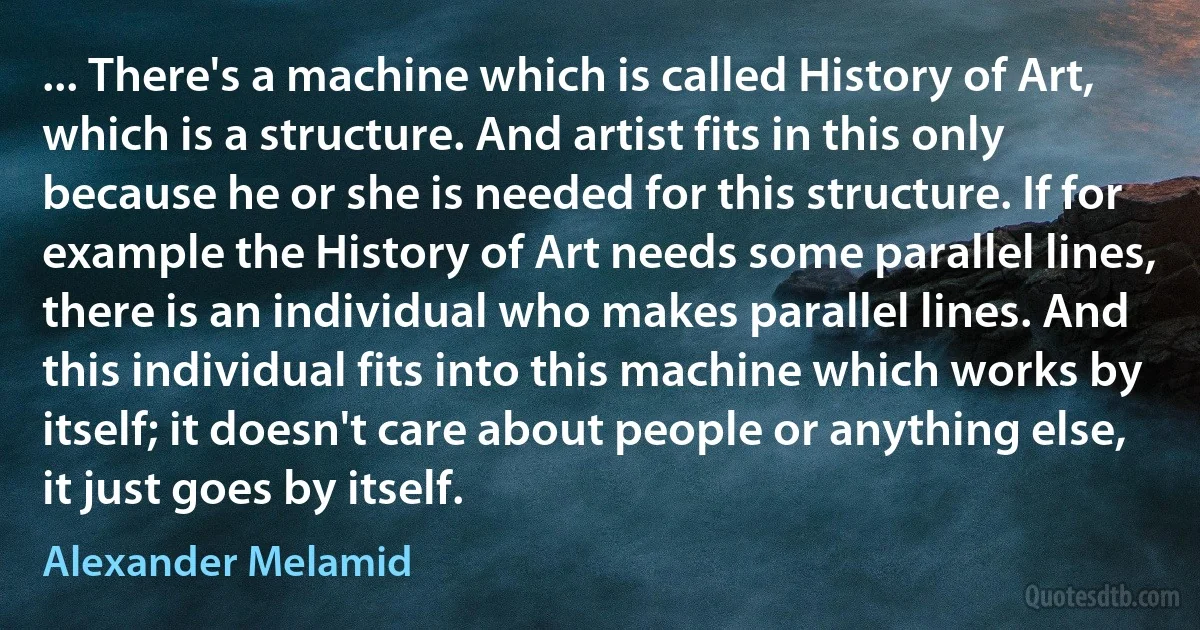Machine Quotes - page 20
I told her I had always lived alone and I probably always would
And all I wanted was my freedom
And she told me that she understood
But I let her do some of my laundry
And she slipped a few meals in between
And the next thing I remember, she was all moved in
And I was buying her a washing machine.

Jackson Browne
A civilization which is dominated by this matter-of-fact insight must prevail against any cultural scheme that lacks this element. This characteristic of western civilization comes to a head in modern science, and finds its highest material expression in the technology of the machine industry.

Frank Knight
Life was growing and spreading here the way a disease propagates and eats and in the eating must kill. There should be something more, he thought. A kind of being might come into the universe that did not want to finally eat everything or to command all or to fill every niche and site with its own precious self. It would be a strange thing, with enough of the brute biology in it to have the quick, darting sense of survival. But it would also have to carry something of the machine in it, the passive and accepting quality of duty, of waiting, and of thought that went beyond the endless eating or the fear of dying. To such a thing the universe would not be a battleground but a theater, where eternal dramas were acted out and it was best to be in the audience. Perhaps evolution, which had been at the beginning a blind force that pushed against everything, could find a path to that shambling, curiously lasting state.

Gregory Benford
I suggest that the hon. gentleman may be a good corporation lawyer, but he is slipping badly in his history. The capitalist system did not produce the machine age; the machine age produced the capitalist system. The material prosperity that the world has enjoyed for the last seventy-five years or one hundred years has been due to the introduction of power; steam power, then electric power and the internal combustion engine. The capitalist system or the free enterprise system - the terms are synonymous and interchangeable - was the product of the power age. The capitalist system did not produce the power age.

Tommy Douglas
Government is not, must not be, a cold, impersonal machine, but a human and more human agency: appealing to the reason, satisfying the heart, full of mercy, assisting the good, resisting the wrong, delivering the weak from any impositions of the powerful. This is not paternalism. It is not a servitude imposed from without, but the freedom of a right to self-direction from within.

Calvin Coolidge
The previous regime - armed with its arrogant and intolerant ideology - reduced man to a force of production, and nature to a tool of production. In this it attacked both their very substance and their mutual relationship. It reduced gifted and autonomous people, skillfully working in their own country, to the nuts and bolts of some monstrously huge, noisy and stinking machine, whose real meaning was not clear to anyone.

Václav Havel
I am so confined, writing passes, etc., that it is impossible for me to attend to the duties of the day, which, in many instances, prejudices the service. Such a confined situation leaves one no opportunity of viewing things for themselves. It is recommended, by one of the greatest Generals of the age, not only to issue orders, but to see to the execution; for the army being composed of men of indolence, if the commander is not attentive to every individual in the different departments, the machine becomes dislocated, and the progress of business retarded.

Nathanael Greene
[something like] a badly constructed or repaired motor, or like that wonderful event of Tinguely's, where he made a huge contraption in the backyard of the Museum of Modern Art called 'Homage to New York', which was a machine that destroyed itself in various humorous ways. It's that breakdown system along with slippages that you can't predict I find most interesting, not because I want to make a point about society as being a broken down system or that all life is entropic - I don't, but rather that its process is unforeseeable.

Allan Kaprow
Anxiety, the next gumption trap, is sort of the opposite of ego. You're so sure you'll do everything wrong you're afraid to do anything at all. Often this, rather than "laziness," is the real reason you find it hard to get started. This gumption trap of anxiety, which results from over-motivation, can lead to all kinds of errors of excessive fussiness. You fix things that don't need fixing, and chase after imaginary ailments. You jump to wild conclusions and build all kinds of errors into the machine because of your own nervousness. These errors, when made, tend to confirm your original underestimation of yourself. This leads to more errors, which lead to more underestimation, in a self-stoking cycle. The best way to break this cycle, I think, is to work out your anxieties on paper. Read every book and magazine you can on the subject. Your anxiety makes this easy and the more you read the more you calm down.

Robert M. Pirsig
We are at the classic-romantic barrier now, where on one side we see a cycle as it appears immediately-and this is an important way of seeing it-and where on the other side we can begin to see it as a mechanic does in terms of underlying form-and this is an important way of seeing things too. These tools for example-this wrench-has a certain romantic beauty to it, but its purpose is always purely classical. It's designed to change the underlying form of the machine.

Robert M. Pirsig
Ladies and Gentleman of the jury, I'm just a Caveman. I fell in some ice and later got thawed out by your scientists. Your world frightens and confuses me. Sometimes the honking horns of your traffic make me want to get out of my BMW and run off into the hills or whatever. Sometimes when I get a message on my fax machine, did little demons get inside and type it? I don't know. My primitive mind can't grasp these concepts.

Phil Hartman
Fumbling in total darkness, they reached out to each other, naked, he penetrated her with desire and she received him eagerly, and they exchanged eagerness and desire until their bodies were locked in embrace, their movements in harmony, her voice rising from the depth of her being, his totally submerged, the cry that is born, prolonged, truncated, that muffled sob, that unexpected tear, and the machine trembles and shudders, probably no longer even on the ground but, having rent the screen of brambles and undergrowth, is now hovering at dead of night amid the clouds, Blimunda, Baltasar, his body weighing on hers, and both weighing on the earth, for at last they are here, having gone and returned.

José Saramago
To Leonardo a landscape, like a human being, was part of a vast machine, to be understood part by part and, if possible, in the whole. Rocks were not simply decorative silhouettes. They were part of the earth's bones, with an anatomy of their own, caused by some remote seismic upheaval. Clouds were not random curls of the brush, drawn by some celestial artist, but were the congregation of tiny drops formed from the evaporation of the sea, and soon would pour back their rain into the rivers.

Kenneth Clark
Look round the world: contemplate the whole and every part of it: You will find it to be nothing but one great machine, subdivided into an infinite number of lesser machines, which again admit of subdivisions, to a degree beyond what human senses and faculties can trace and explain. All these various machines, and even their most minute parts, are adjusted to each other with an accuracy, which ravishes into admiration all men, who have ever contemplated them. The curious adapting of means to ends, throughout all nature, resembles exactly, though it much exceeds, the productions of human contrivance; of human design, thought, wisdom, and intelligence.

David Hume
An autopoietic machine is a machine organized (defined as a unity) as a network of processes of production (transformation and destruction) of components which:
(i) through their interactions and transformations continuously regenerate and realize the network of processes (relations) that produced them; and
(ii) constitute it (the machine) as a concrete unity in space in which they (the components) exist by specifying the topological domain of its realization as such a network.

Humberto Maturana
In fact, giving society cheap, abundant energy at this point would be the moral equivalent of giving an idiot child a machine gun. With cheap, abundant energy, the attempt clearly would be made to pave, develop, industrialize, and exploit every last bit of the planet-a trend that would inevitably lead to a collapse of the life-support systems upon which civilization depends.

Paul R. Ehrlich



